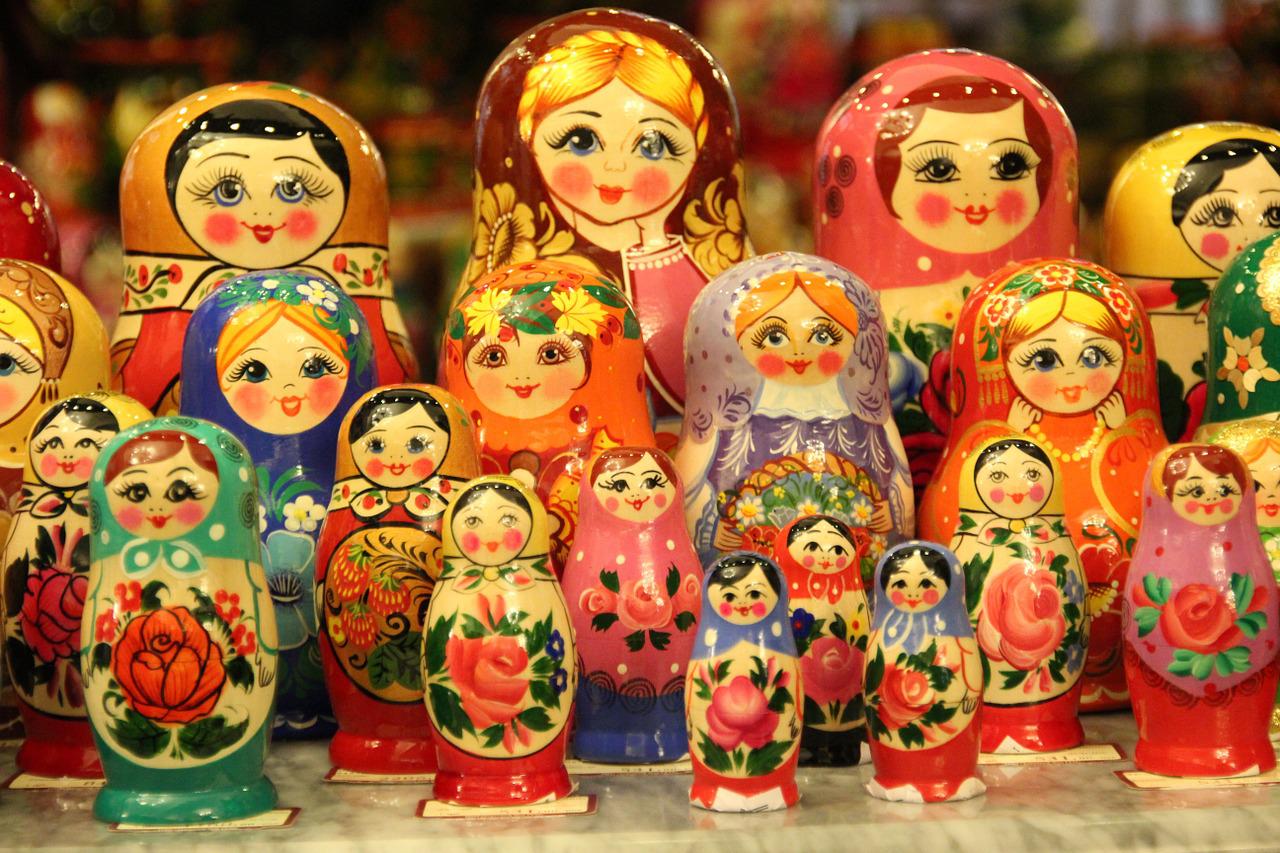Большой или маленький? Big or Small? Basic Descriptions of Things in Russian
In this post you’ll learn some basic descriptions of things in Russian. That means that you’ll learn how to use Russian adjectives to describe things. First you’ll learn colors in Russian along with some examples. Then you’ll learn other common adjectives you can use to give descriptions of things in Russian. Along the way, we’ll point out a few important grammar points to keep in mind when you’re using Russian adjectives.
Colors in Russian
First let’s start with colors in Russian: чёрный (m) / чёрная (f) / чёрное (n) black; белый (m) /белая (f)/ белое (n) white; красный (m) / красная (f) /красное (n) red; голубой (m) / голубая (f) / голубое (n) light blue; синий (m) /синяя (f) / синее (n) (dark) blue; жёлтый (m) / жёлтая (f) / жёлтое (n) yellow; зелёный (m) / зелёная (f)/ зелёное (n) green; коричневый (m) / коричневая (f) / коричневое (n) brown; серый (m)/серая (f)/ серое (n) gray.
- Какой это цвет?
What color is this? - Эта собака чёрная.
This dog is black. - Этот кот белый.
This cat is white. - Наша машина синяя.
Our car is blue. - Флаг России бело-сине-красный (белый, синий и красный).
The Russian flag is white, blue, and red.
GRAMMAR TIP!
Notice that there are three forms given for each adjective, masculine, feminine, and neuter. Russian adjectives must agree with the gender (m, f., or n), number (singular or plural), and case (nominative, accusative, genitive, dative, instrumental, prepositional) of the nouns they modify.
- Эта собака чёрная.
This dog is black.
чёрная is feminine, singular, and nominative to agree with the subject собака. - Я вижу чёрную собаку.
I see a black dog.
чёрную is feminine, singular, accusative to agree with the direct object собаку. - Я не знаю имени черной собаки.
I don’t know the black dog’s name.
черной is feminine, singular, genitive to agree with the possessor собаки.
If you’d like to see a quick summary of Russian adjective agreement, check out the tip at the end of the post.
Other Common Russian Adjectives
Next let’s look at several other important basic adjectives: хороший/ хорошая/ хорошее good; плохой/ плохая/ плохое bad; большой/ большая/ большое big; маленький/ маленькая/ маленькое small; красивый/ красивая/ красивое beautiful; уродливый/ уродливая/ уродливое ugly; старый/ старая/ старое old; новый/ новая/ новое new; длинный/ длинная/ длинное long; короткий/ короткая/ короткое short; высокий/ высокая/ высокое high; низкий/ низкая/ низкое low; пустой/ пустая/ пустое empty; полный/ полная/ полное full; широкий/ широкая/ широкое wide; узкий/ узкая/ узкое narrow; жёсткий/ жёсткая/ жёсткое hard; мягкий/ мягкая/ мягкое soft; трудный/ трудная/ трудное difficult; лёгкий/ лёгкая/ лёгкое easy.
- Этот ресторан хороший/плохой.
This restaurant is good/bad. - Мы в хорошем ресторане.
We are in a good restaurant. - Эта книга хороша.
This book is good. - Я читаю хорошую книгу.
I’m reading a good book. - Этот фильм старый/новый.
The film is old/new. - Смотрим старый/новый фильм.
We’re seeing an old/new film. - Этот город красивый/большой.
The city is beautiful/big. - Мы живем в большом/маленьком городе.
We live in a big/small city. - Эта улица широкая/узкая.
The street is wide/narrow. - Эта кровать жёсткая/мягкая.
The bed is hard/soft. - Этот стакан полон/пуст.
The glass is full/empty.
GRAMMAR TIP! Adjective Agreement
Finally let’s talk a little bit about Russian grammar. Remember that adjectives in Russian agree with the noun that they describe by taking different endings. Take the adjective хороший (good) as an example. Depending on the noun it’s describing, it can be in the masculine singular (хороший), the feminine singular (хорошая), the neuter singular (хорошое), or the plural (хорошие).
- хороший день a good day (masculine)
- хорошая ночь a good night (feminine)
- хорошое утро a good morning (neuter)
- хорошие дни / ночи / утро good days/nights/mornings (plural)
Adjective Agreement in Other Cases
The forms above are just the nominative forms. Adjectives, just like nouns, decline for case. For example if the adjective хороший modifies a direct object, it will take accusative endings.
- Я читаю хороший роман. I’m reading a good novel.
- Я читаю хорошую книгу. I’m reading a good book.
- Я читаю хорошее письмо. I’m reading a good letter.
- Я читаю хорошие романы /книги / письма. I read good novels/books/letters.
As an example of another case, the adjective хороший is in the prepositional (or locative) here:
- Я читал(а) это в хорошем романе. I read that in a good novel.
- Я читал(а) это в хорошей книге. I read that in a good book.
- Я читал(а) это в хорошем письме. I read that in a good letter.
- Я читал(а) это в хороших романах/книгах/письмах. I read that in good novels/books/letters.
There are different types of adjectives, with slightly different endings, and sometimes it matters whether the noun is animate or inanimate. But in a nutshell, when you use adjectives in Russian, you need to know the gender (masculine, feminine, or neuter), number (singular or plural), and case (nominative, accusative, genitive, dative, instrumental, prepositional) of the noun being modified.
Short and Long Form Adjectives
Another thing that you’ll see in Russian is that a lot of adjectives have long and short forms. The short form is limited in use; typically only simple statements where English uses is/are. These are predicate adjectives, if you like grammatical terminology, as opposed to attributive adjectives, which always use long forms. Short adjectives, because of the way they’re used, are only possible in the nominative.
- Это хороший роман. This is a good novel. (Long Form, as an attributive adjective)
- Роман хорош. The novel is good. (Short Form, as a predicate adjective)
- Это хорошая книга. This is a good book. (Long Form)
- Книга хороша. The book is good. (Short Form)
- Это хорошее письмо. This is a good letter. (Long Form)
- Письмо хороше. The letter is good. (Short Form)
Get on the road to speaking Russian with the Language Garage!
We hope you’ve enjoyed learning about basic descriptions of things in Russian. Now you know colors in Russian along with some other common Russian adjectives. If you’d like to learn more, check out our other posts on Russian language, culture, and more. And if you’re looking for convenient and affordable live Russian lessons with a real teacher, check out The Language Garage Russian. Our lessons are given online in a virtual classroom, so it doesn’t matter where you live or work. We can come to you. And we have flexible options, with a free trial so that you can decide if there’s a fit. Check us out!
Image by Peggy und Marco Lachmann-Anke from Pixabay






